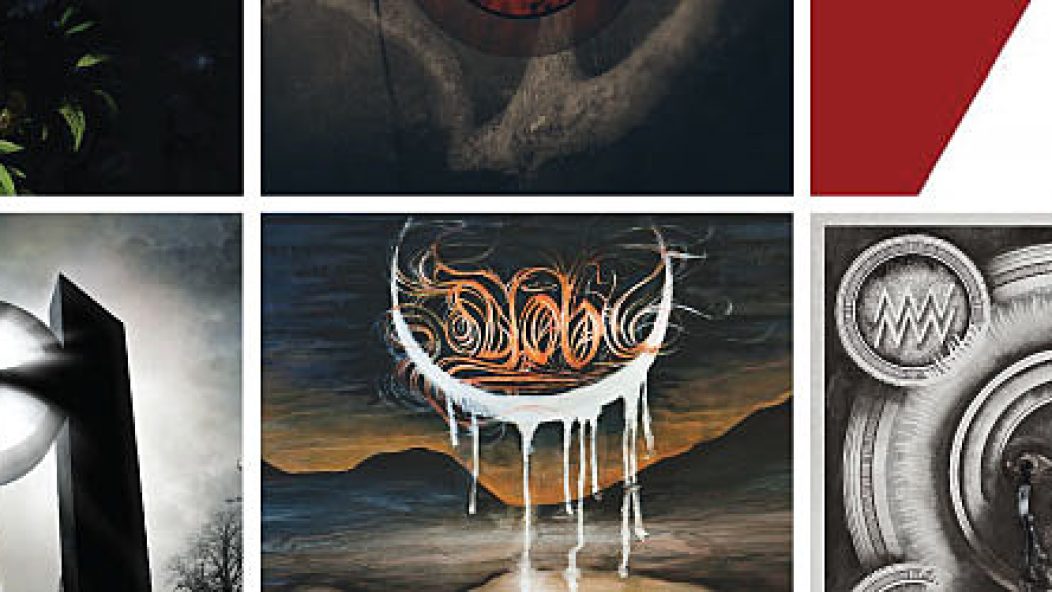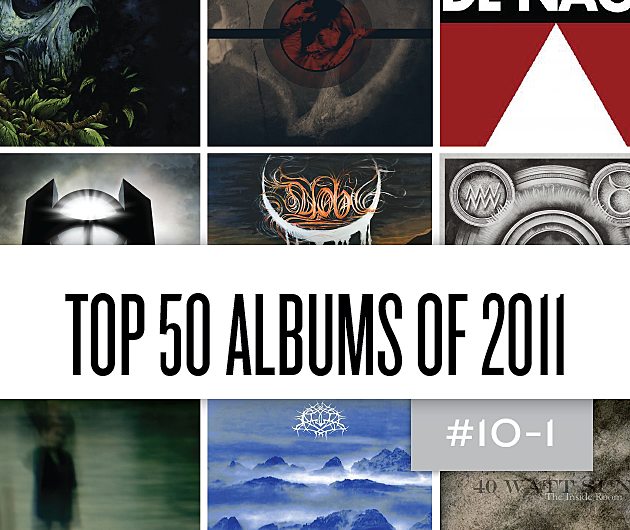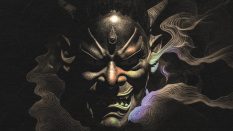
Top 50 Metal Albums of 2011, 10 to 1

For an explanation of how we determined our Top 50 albums of 2011 (and for a look at
albums 75 to 51), see our first post in the series, Top Albums of 2011, 75 to 51.
10. 40 Watt Sun – The Inside Room (Cyclone Empire, England)
Even as it’s drowning in gauzy, self-indulgent gloom, The Inside Room envelops the listener with a warm blanket of hope; a sliver of silver-lining sunshine poking through on a miserable day. It’s impossible to come away from the album without a bright-and-shiny-eyed view after wallowing in its sublime saturninity. Patrick Walker has crafted an album of supreme beauty, lachrymose cheer masquerading as caterwauling dejection. Song after heart-wrenching song, The Inside Room provides a light at the end of a long, dark tunnel–or a light-switch to turn it off, if you’d prefer to wallow just a little longer. —Kyle Harcott
. . .
http://www.youtube.com/watch?v=KXAX4Az8csQ
40 Watt Sun – “Carry Me Home”
. . .
9. Bosse-de-Nage – II (The Flenser, USA)
To call Bosse-de-Nage “unknown” prior to 2011 would be an understatement. The project had languished in abject obscurity since its 2006 inception and was only recently inflicted upon a larger audience thanks to the efforts of Aesop Dekker (who released their two demos via his tape label Funeral Agency) and The Flenser, who released their debut LP last year. The follow-up, II, is a bizarre journey through sadism and filth, complete with unnerving, harrowing, howled vocals and dense, crisp guitar harmonies. Taking musical cues as well as depraved inspiration from the French–Mortifera, Celestia–as well as from post-punk architects Slint, Bosse-de-Nage embrace minimalism and madness, creating dense layers of fragile melody and shuddering heaviness. This is warped black metal borne of syphilitic lust, gleeful perversion, eccentric genius, decadence, and decay.—Kim Kelly
. . .
http://www.youtube.com/watch?v=6mdutxaFbNU
Bosse-de-Nage – “Chapter 1”
. . .
Read the Invisible Oranges review of Bosse-de-Nage’s II.
8. Krallice – Diotima (Profound Lore, USA)
My metal BFF recently told me, “Krallice should be preserved in museums for future generations”. Considering how much metal gets released in a year, there aren’t many bands lucky enough to be labeled “epic” without some doubt applied to the term. Even if a group achieves greatness for an album or two, it’s exceedingly difficult to remain consistent in such a dynamic genre, a trait which separates the good from the great. On their third full-length, Diotima, Krallice continue their string of progressive releases worthy of the term “epic” and solidify themselves as one of the greatest forces in black-metal history. They don’t write songs in the simple sense of the word; they write compositions with enormous hooks and developed melodies that reflect classical music as much as black metal. Both Mick Barr and Colin Marston continue to dazzle listeners with musical ideas that speak volumes; and much like with classical music, your intelligence increases the more you absorb their language . . . or at least, it feels that way. What Krallice creates exceeds talent alone and instead crosses over into a new form of speech that will presumably continue to develop with every ensuing album. —Aaron Maltz
. . .
Krallice – “The Clearing”
. . .
7. Altar Of Plagues – Mammal (Profound Lore, Ireland)
Mammal is a perfect title. The album is warm-blooded, a deceptive predator. The more you listen, the more you realize that it doesn’t seek to render you numb but rather to make you feel. It’s moving because it speaks to what makes us human. Altar of Plagues is frequently compared to Wolves in the Throne Room. There’s a palpable difference. Wolves compress every possible note into songs. It’s like running through a dense forest with brambles hitting your face. Mammal offers an opening into that forest. Many rewards await those willing to spend time with Mammal. Listening to it is like walking down an empty street with a friend after a blizzard. It looks like the end of the world, but there is an anchor to keep you connected to humanity. —Justin M. Norton
. . .
Altar Of Plagues – “Feather and Bone”
. . .
Read the Invisible Oranges review of Altar Of Plagues’s Mammal.
6. The Gates of Slumber – The Wretch (Rise Above Records, USA)
This Indiana trio has been keeping what Fenriz would refer as “the Church of Real Metal” alive and well for almost 15 years, not once descending into self-parody in the way lesser bands might have. On the grueling The Wretch, GOS lay testament to their down-to-earth nature with an album of unease and uncertainty, supported by some insanely massive riffage. Frontman Karl Simon almost seems to be one of the few individuals to actually get what Black Sabbath was about: both gnarly licks and dour doomsaying. Songs about alcoholism, drug abuse, and suicide temper the obligatory “metal” tracks, thus proving that GOS have a substance beyond mere metallic throwback. Previous albums of theirs have tended to the more fantastical, but with The Wretch GOS demonstrate the ability to rock out while still remaining grounded in the real world, a quality that lesser bands would do well to emulate. —Rhys Williams
. . .
The Gates of Slumber – “Coven of Cain”
. . .
Read the Invisible Oranges review of The Gates of Slumber’s The Wretch.
5. Ulcerate – The Destroyers of All (Willowtip, New Zealand)
There isn’t much middle ground between brutal death and atmospheric post metal, but whatever there is has been claimed and colonized by New Zealand’s Ulcerate. Their looming riffage–sometimes droning, sometimes fractured, often, amazingly, both–is pushed along by hyperactive, hyperdetailed drum work. The blasting will cease for a moment, reprieved by a melody, only for it to be shattered and the chaos returned. But The Destroyers of All‘s distinct style isn’t new, having already been explored on 2009’s Everything is Fire. What separates the two albums is that, while Everything Is Fire delineated Ulcerate’s two tendencies–brutal and atmospheric–The Destroyers of All embraces the contradictions and merges them. It helps that the band has become much better songwriters over the past two years, evidenced by the monolithic climaxes of “Cold Becoming” and the titular track, moments that might feel triumphant were it not for the enveloping bleakness (both lyrical and musical) that surrounds them. In a year of death metal dominated by the two poles of old-school throwback and the self-conscious avant-garde, Ulcerate is a singular voice. Yes, they’re experimental. Yes, they’re harsh and uncompromising. But these traits aren’t the result of a willful attempt to sound like something; they’re the result of a slow refinement, and an authentic vision. All of the overused comparisons (so overused they do not bear mention here) that get thrown in Ulcerate’s direction should finally be discarded. The only thing they sound like now is themselves. —Michael Cacciatore
. . .
http://www.youtube.com/watch?v=LMP60NMEpBk&feature=results_video&playnext=1&list=PL8028C8C617DDCDF9
Ulcerate- “The Hollow Idols”
. . .
4. YOB – Atma (Profound Lore, USA)
Metal too often revels in destruction, death, and chaos. YOB instead revels in the act of creation, the search for insight, and the spiritual mysteries that bind us. Atma pulls off the seemingly contradictory goals of unrelenting heaviness paired with introspection. “Prepare The Ground” ask listeners to hold each individual moment sacred with a mantra-like riff. “Before We Dreamed Of Two” adds to the mystical feel with a Middle Eastern-flavored opening and abrasive vocals from Neurosis’ Scott Kelly trading with Mike Scheidt’s nasal voice. Decades of meditation and studying Eastern mysticism have equipped Scheidt with the ability to write riffs that seem to have existed for thousands of years. He unearths them like a scientist finding ancient artifacts in hardened amber. Unlike museum pieces, though, they are living, breathing things, signposts to find solace through heaviness. You don’t listen to the riffs as much as you inhabit them. Atma shows that you don’t need a chiming bell to answer the call to meditation; the search within can start with distorted guitars. —Justin M. Norton
. . .
http://www.youtube.com/watch?v=ZdxiEmvHVvI
YOB – “Prepare the Ground”
. . .
Read the Invisible Oranges review of YOB’s Atma.
3. Amebix – Sonic Mass (Easy Action Records, UK)
Amebix returned, and returned in a big way with Sonic Mass. The Baron spent over two decades in the Scottish hills tempering steel blades, and with Sonic Mass as the sonic proof, the Baron learned how to sharpen Amebix’s steel as well. No Gods, No Masters? More like No Rust and No Filler.
Some have claimed Amebix drew inspiration from Killing Joke and went alt-metal, but I don’t hear it. What I do hear is Amebix’s best album to date, a chugging assault tempered with subtlety, melody, and even greater intelligence than before. Some whined about the production, but the Baron is on record that the classics sounded thin due to circumstances beyond artistic control. Prior Amebix albums were collections of songs. Most of the songs were great, but there was never a sense of total cohesion or linear flow. Sonic Mass is truly heavy metal mass, a series of events, each song indelibly linked to the one before it and after it. “I.C.B.M.” and “Arise” were self-contained messages. Sonic Mass is the message.
Sonic Mass is Amebix growing and progressing without becoming prog or leaving its roots behind. Amebix’ hallmark is the contradiction, the diametrically opposed: depressing yet hopeful. Angry, yet positive. Horrified, repulsed, sad, and disappointed in Humanity, yet finding solace in our collective embrace. Amebix still bring The Contradiction. Intelligent, affecting, unique. That is Amebix in 1987, and that is Amebix in 2011. —Richard Street-Jammer
. . .
http://www.youtube.com/watch?v=_q60XK-xhcw
Amebix – “The Messenger”
. . .
Read the Invisible Oranges review of Amebix’ Sonic Mass.
2.Tombs – Path of Totality (Relapse Records, USA)
Metal becomes more heterogeneous with each passing year. The days of discreet subgenres and cloistered scenes are long gone. Many of metal’s most exciting current bands are exciting precisely because they defy convention.
Tombs are such a band. This New York City trio culls from across the metal spectrum to craft their music. Black metal, doom, and Neurosis-style crescendos all figure prominently here. So do non-metal influences, like hardcore and ’80s postpunk/goth rock.
But to focus on Tombs’ influences is to miss the forest for the trees. On Path of Totality, their second album, they cement the identity that they began to codify on their debut. They’re as individual as metal bands get. At first, Tombs seem to deal with familiar metal themes: biblical plagues, social decay, and cosmic retribution. But beneath the apocalyptic imagery lies resignation and even vulnerability. Mike Hill, the band’s imposing frontman, hints at his anxieties in sere, McCarthy-esque terms: “Black iron cell isolates the beast inside / The body dies, yet the soul remains.”
This tension manifests in Tombs’ music as well. Path of Totality is violent and volatile; you can feel its John Congleton production pounding in your chest even at low volumes. But for every rhythmic drubbing, there’s a delicate guitar layer or emotive vocal. Tombs are grim and gorgeous all at once. Theirs is the kind of fusion that really matters.—Doug Moore
. . .
Tombs – “Vermillion”
. . .
1. Wolves in the Throne Room – Celestial Lineage (Southern Lord, USA)
The appearance of authenticity in black metal is often awarded a higher value than, say, the actual merits of the music itself. No, not every black metal fan is so . . . stuck up, I guess, as to reject certain bands due to some perceived falseness, but even at its largest, the black metal community is small enough that the voice of pretty much every faction is heard. Outside of Liturgy, in 2011, no band heard it louder or more frequently than Wolves in the Throne Room. The band’s fourth LP, Celestial Lineage, earned them a 1,400-word profile in The New Yorker, a Best New Music nod on Pitchfork, and the animosity of a sub-subculture constantly hunting darker, more obscure corners for some increasingly elusive, rarer form of purity.
But as Søren Kierkegaard said, “Tr00th is subjective”. Here’s how I see it: Wolves in the Throne Room—comprising brothers Aaron and Nathan Weaver (who respectively play drums, synth, bass, guitar; and guitar, lead vocals)—have made some amazing music over the course of their career but they had never released a truly great album . . . until this year. Celestial Lineage was a galaxy of sounds all somehow in perfect alignment. Its opening track alone, the 12-minute “Thuja Magus Imperium”, had more textures and tones than some bands employ in their entire career. The track opens with bells and chimes and the ethereal, Middle Eastern-influenced female vocals of Jessika Kenney. It’s gorgeous and spacious, and it builds momentum slowly, until the guitars and drums tear through the serenity like a swarm of locusts filling a cloudless sky with a buzzing, predatory darkness. At the center of the song is a simple cascading (Cascadian?) riff, which is presented a few times, altered slightly each time. The song swells and sighs and roars like Kurosawa’s Ran, almost operatic in its swaying grandeur.
Not every song here is so ambitious, but Celestial Lineage is definitely an epic work. Its smaller pieces fit into the massive whole to build the mood or slow the pace, and all of the longer songs have numerous digressions built into their structures. Like much of the very best black metal, from Filosofem and Nattens Madrigal to Marrow of the Spirit and Mammal, Lineage connects deeply with the natural world, presenting sound with a scale and wonderment matched only by the wilderness: sound that feels like a forest floor dappled by sunlight, like the sudden wind before a hard rain, like an endless black sky lit by moonlight and stars.
According to the band, Celestial Lineage is the conclusion of a trilogy that began with their second album, Two Hunters. After 2011, if the intimations of the Brothers Weaver are to be taken at face value, Wolves in the Throne Room will break up, or stop touring, or something. They are going to be something different. Not black metal anymore, maybe. Maybe they never were. And people are free to say whatever they want about whatever, but I can’t see how you can question the authenticity of these sounds, this music.—Mike Nelson
. . .
http://www.youtube.com/watch?v=4lmjAgPAc0U
Wolves in the Throne Room – “Astral Blood”
. . .
Read the Invisible Oranges review of Wolves in the Throne Room’s Celestial Lineage.











